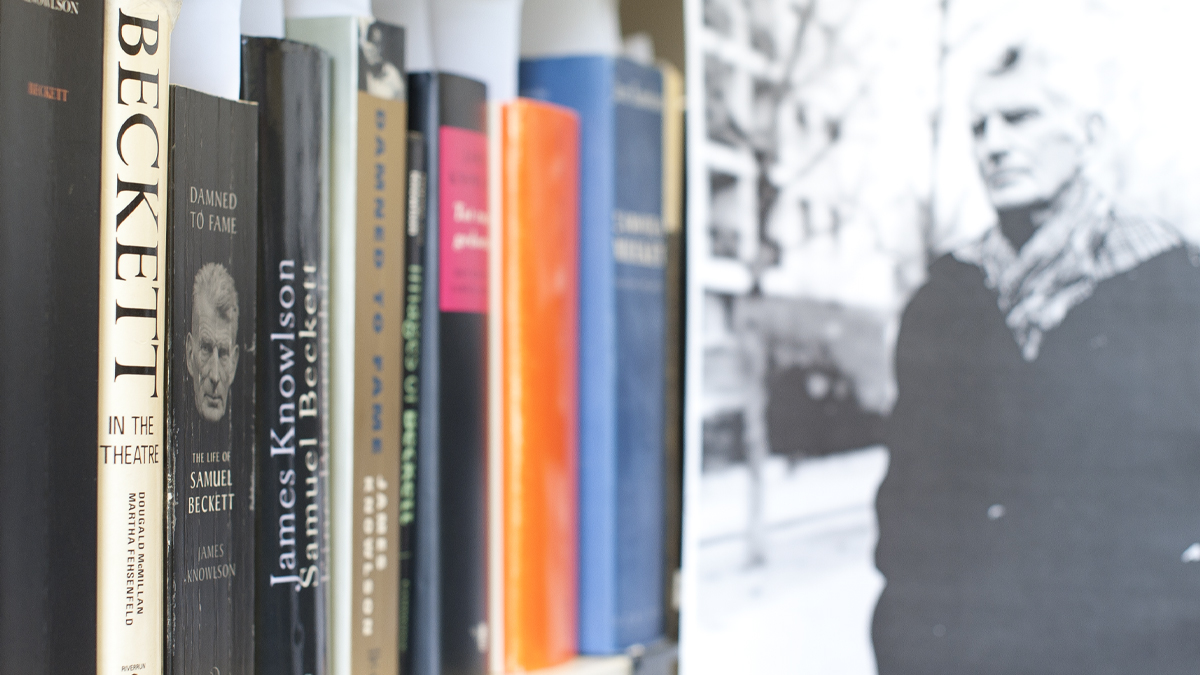Will hadn't encountered Beckett prior to joining the University of Reading, but the focus on the author throughout his studies, coupled with the ability to access the Beckett archive, created a new-found passion.
Reading's archive holds host to a diverse amount of materials, including theatrical notebooks, correspondence, stage files and manuscripts.
"I studied the drama at undergraduate level and I have ended up working on Beckett and War as my thesis - looking at the effects of the Second World War on his work. For this, I have used the University Beckett archive but also the other Beckett archive collections - the major ones are in Ireland and Texas."
"It certainly helped to find out that we have a Beckett archive at the University, there are mountains of stuff like diaries and notebooks. Using these materials, I was able to pursue my interest in Literature and History in my thesis, but on Beckett instead of the Classics I'd planned on doing!"
Insight into Beckett's processes
Looking at Beckett's material in the Reading archive provides insight into the writer's processes and the development of his work, which Will found fascinating.
"Beckett often begins with a particular image or idea and you can see it in the manuscript - that will generate the text. Looking at that development and also looking at what he removes is almost the most important thing. "Looking at that kind of scaffolding that gets pulled away, often it's historical place names or references to contemporary life. The published work comes across as this abstract, alienated or slightly detached situation whereas the manuscripts often reveal fairly specific references which seem to have given him a kind of inspiration."
By being able to study Beckett's manuscripts, Will discovered that it was possible to uncover references or allusions about the writer in relation to other writers of that period.
"The manuscripts can help situate Beckett in the networks of writers in France and Ireland that surrounded him. They can show what was unique about Beckett but also what he took or adapted from others."
Handling original materials
Will has hosted a session on the Murphy notes, Beckett's first novel, at London Road. A discussion was held with his students as they looked through the manuscript to try and find where the opening chapter started. They found handling original material, a unique learning experience.
"There is something very exciting about handling an author's materials. There's something very tactile about them and I have taught using them myself - Beckett is quite High Art and yet you can see a beer stain on the manuscript!"
"I think it's exciting to be able to engage with the creative process and see the problems and issues around getting the published text. We have publisher's reports - you can look at the full birth of a text in a way which I think is quite unique."
Looking beyond the text
While looking through Beckett's work in the archive, Will has stumbled upon many interesting hints to the writer's character. He found the Murphy notebooks to be particularly exciting, as you get a sense of who Beckett was before his most famous works.
"You can see the young writer trying to grapple with what he wants to work on, and that comes across with the amount of deletions you get in that opening chapter, and also the amount of doodles that fill the notebooks. He doodled everyone from Charlie Chaplin to James Joyce. It's quite cool to see that creative process.
"Also, these were in private hands so very few people had seen them prior to coming here, and being able to teach with them was amazing. They are a very unique part of the Beckett archive and Beckett's career."
